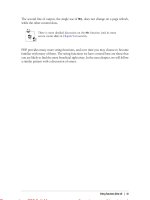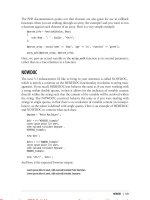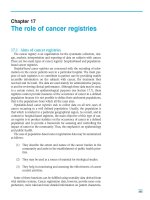The Fundamentals of Literacy Coaching docx
Bạn đang xem bản rút gọn của tài liệu. Xem và tải ngay bản đầy đủ của tài liệu tại đây (1.5 MB, 130 trang )
Association for Supervision and Curriculum Development
Alexandria, Virginia USA
The Fundamentals of
Literacy Coaching
Amy Sandvold
Maelou Baxter
C
reating a peer literacy coaching initiative from scratch is no easy
task. Making it focused, dynamic, and effective is even harder. In
this inspiring and immensely readable book, veteran educators Amy
Sandvold and Maelou Baxter present a blueprint for creating a successful
coaching plan in districts and schools. Drawing both on their personal
experiences and on conclusions from the research, the authors offer clear
and candid advice on such issues as
• Choosing appropriate coaches among teachers and training them to
coach effectively.
• Tailoring literacy coaching initiatives to particular schools or
districts.
• Creating balanced coaching schedules that take into account the
needs of everyone involved.
• Working harmoniously with fellow coaches and school staff.
• Using assessment data to strengthen coaching practices.
From establishing an initial coaching vision to ensuring its lasting legacy,
all aspects of peer literacy coaching are covered in The Fundamentals of
Literacy Coaching. Equally suitable for teachers and administrators, this
book is an indispensable guide for those seeking to improve the quality
of literacy education in their schools.
Education
BROWSE EXCERPTS
FROM ASCD BOOKS:
/> $21.95 U.S.
Amy Sandvold | Maelou Baxter
The Fundamentals of Literacy Coaching
The Fundamentals of
Literacy Coaching
Association for Supervision and Curriculum Development
Alexandria, Virginia USA
The Fundamentals of
Literacy Coaching
Amy Sandvold
Maelou Baxter
Association for Supervision and Curriculum Development
1703 N. Beauregard St. • Alexandria, VA 22311-1714 USA
Phone: 800-933-2723 or 703-578-9600 • Fax: 703-575-5400
Web site: www.ascd.org • E-mail:
Author guidelines: www.ascd.org/write
Gene R. Carter, Executive Director; Nancy Modrak, Director of Publishing; Julie Houtz, Director
of Book Editing & Production; Ernesto Yermoli, Project Manager; Cathy Guyer, Senior Graphic
Designer; Valerie Younkin, Desktop Publishing Specialist; Sarah Plumb, Production Specialist
Copyright © 2008 by the Association for Supervision and Curriculum Development (ASCD).
All rights reserved. No part of this publication may be reproduced or transmitted in any
form or by any means, electronic or mechanical, including photocopy, recording, or any
information storage and retrieval system, without permission from ASCD. Readers who wish
to duplicate material copyrighted by ASCD may do so for a small fee by contacting the Copy-
right Clearance Center (CCC), 222 Rosewood Dr., Danvers, MA 01923, USA (phone: 978-
750-8400; fax: 978-646-8600; Web: www.copyright.com). For requests to reprint rather
than photocopy, contact ASCD’s permissions offi ce: 703-575-5749 or
Translation inquiries:
Printed in the United States of America. Cover art copyright © 2008 by ASCD. ASCD publi-
cations present a variety of viewpoints. The views expressed or implied in this book should
not be interpreted as offi cial positions of the Association.
All Web links in this book are correct as of the publication date below but may have become
inactive or otherwise modifi ed since that time. If you notice a deactivated or changed link,
please e-mail with the words “Link Update” in the subject line. In your
message, please specify the Web link, the book title, and the page number on which the link
appears.
PAPERBACK ISBN: 978-1-4166-0677-2 ASCD product #107084 s4/08
Also available as an e-book through ebrary, netLibrary, and many online booksellers
(see Books in Print for the ISBNs).
Quantity discounts for the paperback edition only: 10–49 copies, 10%; 50+ copies, 15%;
for 1,000 or more copies, call 800-933-2723, ext. 5634, or 703-575-5634. For desk copies:
Library of Congress Cataloging-in-Publication Data
Sandvold, Amy, 1971–
The fundamentals of literacy coaching / Amy Sandvold and Maelou Baxter.
p. cm.
Includes bibliographical references and index.
ISBN 978-1-4166-0677-2 (pbk. : alk. paper) 1. Reading teachers—In-service training—
United States. 2. Teachers—Professional relationships—United States. I. Baxter, Maelou,
1940– II. Title.
LB2844.1.R4S26 2008
428.4071’5—dc22
2007050939
18 17 16 15 14 13 12 11 10 09 08 07 1 2 3 4 5 6 7 8 9 10 11 12
This book is dedicated to the students,
the ultimate benefi ciaries of literacy coaching.
Why else would we be doing this?
The Fundamentals of
Literacy Coaching
Acknowledgments . . . . . . . . . . . . . . . . . . . . . . . . . . . . . . . . . . ix
Foreword . . . . . . . . . . . . . . . . . . . . . . . . . . . . . . . . . . . . . . . . .xv
Introduction . . . . . . . . . . . . . . . . . . . . . . . . . . . . . . . . . . . . . . xix
Fundamental 1: Be Prepared . . . . . . . . . . . . . . . . . . . . . . . . . . . .1
Fundamental 2: Make Friends . . . . . . . . . . . . . . . . . . . . . . . . .23
Fundamental 3: Teach! . . . . . . . . . . . . . . . . . . . . . . . . . . . . . . .39
Fundamental 4: Be Consistent . . . . . . . . . . . . . . . . . . . . . . . . .55
Fundamental 5: Keep It Strong with Data . . . . . . . . . . . . . . . . .71
Fundamental 6: Seek First to Understand . . . . . . . . . . . . . . . . .83
Conclusion . . . . . . . . . . . . . . . . . . . . . . . . . . . . . . . . . . . . . . . .89
Bibliography . . . . . . . . . . . . . . . . . . . . . . . . . . . . . . . . . . . . . . .93
Index . . . . . . . . . . . . . . . . . . . . . . . . . . . . . . . . . . . . . . . . . . . .99
About the Authors . . . . . . . . . . . . . . . . . . . . . . . . . . . . . . . . .103
ix
Acknowledgments
W
e would like to acknowledge some brilliant people who
have inspired and coached us together in our common
coaching experiences and infl uenced us individually. This book
evolved and exists today as a result of their collective contribution
and common dedication to helping all students achieve a life rich
in literacy. It would be impossible to highlight all of these people
and institutions, but we must attempt the impossible.
First, we acknowledge the efforts of Carol Watson, our partner in
everything and part of Reading Excellence. Were it not for her new
life as a very busy Reading Recovery teacher leader, she would
have written this book with us. Her work and inspiration, both
personal and professional, are woven through the pages.
THE FUNDAMENTALS OF LITERACY COACHING
x
Our expert friends:
To David Moore, who taught Maelou how to develop and hang
onto a thought.
To Penny Beed of the University of Northern Iowa, who believed
in Amy and encouraged her to have a voice in the world of lit-
eracy. Penny worked alongside both of us to develop and refi ne
our coaching efforts.
To Christine Canning, also of the University of Northern Iowa,
who fi rst told Amy that she had important things to say and
expected to hear about it in the future. Thank you for the inspira-
tion and challenge.
To Marcia Scheppele, Salli Forbes, Mary Ann Poparad, Sylvia
Boehmke, Renee DeBerg, Jan Rowray, Karla Ostby, Mary Hoffman,
and Bonnie Hoewing, who offered their literacy expertise in work-
ing with both children and adults.
To Judy Jeffrey and Ted Stillwell, for supporting and dedicating
themselves to local control in the state of Iowa.
To Nina Carran, for inspiring districts to work toward workplace
professional development.
To Paul Cahill, Teresa McCune, Sandra Johnson, Donna Eggleston,
and Geri McMahon, for providing Amy with positive leadership
and a political foundation.
To P. David Pearson and Barbara Taylor, who, as part of CIERA,
inspired our efforts. We still believe that literacy coaching is
an essential part of helping teachers and students to “Beat the
Odds.”
ACKNOWLEDGMENTS
xi
Our own professional coaches:
We were fortunate enough to select two outstanding people to
coach us and provide professional development to our teachers.
Gail Saunders-Smith and Angela Maiers were more than trainers;
they revolutionized the thinking and practice of the teachers in
the districts in which we worked, and provided both us and the
teachers with expert coaching.
Forward-thinking administrators:
To John Van Pelt, who supported us in every way possible.
To Loleta Montgomery, Helen Melichar, Bob Wright, Ron Morlan,
Bernard Cooper, and Peg Frey, the principals of the Reading Excel-
lence schools, who supported us and helped us to develop our
coaching effort.
To Arlis Swarzendruber, who, as superintendent, did what all wise
leaders do—he recognized a good thing, and he let it happen.
Our “bosses”:
To Rachael Goodwin, Dorothy Winter, and Patrick Clancy, who
supported Maelou, taught her, and let her do her job—mostly as
she saw it.
To Tony Reid, one of Amy’s “bosses,” who saw the possibilities of
workplace coaching and took a risk in implementing a new and
different way of supporting and increasing teacher expertise at his
school.
Dedicated educators who connected us to the realities of the classroom:
To the Key Teachers, who helped us write a district guidebook and
served as advisors.
THE FUNDAMENTALS OF LITERACY COACHING
xii
To the classroom teachers, both reluctant and willing, who allowed
themselves to be coached, and who taught us as much as we taught
them. Amy would specifi cally like to acknowledge the positive
energy and early contributions to this book from her former col-
leagues Sue Oldani, Mary Egli, Laurie Wyckoff, Linda Hansen, Jill
Schulte, Joan Trebon, Joanne White, and Jackie Rubendall.
To Maelou’s Literacy Breakfast friends, Maureen Oates, Peggy Pruis-
ner, and Robin Kautz, who educated, supported, and inspired her.
It was well worth going to breakfast at 6:00 a.m. every Wednesday
morning.
Other important literacy advocates:
To the secretaries, paraprofessionals, custodians, and other “sup-
porters” who helped us in more ways than we can count. Our
special friend, cameraman Dan Evanson, actually became part of
our initiative, and by the end was even answering the questions!
Our editors:
To Carolyn Pool, who liked our book and talked us through its
coming of age with humor and great expertise.
To Ernesto Yermoli, for expert listening, talking with Amy’s stu-
dents, and approaching this task with a collaborative mindset.
Maelou’s special acknowledgments:
To my mother, who was the fi rst to show me that it’s all about
education. She was right then, and she’s right now.
To my family, for always supporting me, being proud of me, and
letting me do “my thing,” no matter how crazy it may have seemed
ACKNOWLEDGMENTS
xiii
to them. To Jen, Kare, Jeff, and Steve; to the “grands,” Jessica, Lin-
coln, Abbie, Zach, and Zoë; and most of all to Ken, who doesn’t
always understand why I want to do what I want to do, but who
always loves me and supports me in the doing.
Amy’s special acknowledgments:
First and foremost, to my husband, Jeff, who tells it like it is and
challenges me to be the best I can be. You are truly my ultimate
coach and best friend. Thank you for supporting me through the
writing of this book and the other professional “itches” that I get,
and for being the excellent husband and dedicated father that you
are to our four children, Houston, Andrew, Anna and Lauren.
Thank you, baby Lauren! Bed rest after you were born gave me
the time to put my passion to the page and write, write, write!
To Kasey Eller. Thank you, Kasey, for getting up early every day
to run several miles and solve what’s wrong with education, for
giving me insight into excellent teaching through what you share,
and, most important, for being a great friend.
To Angela Maiers—thank you for your true friendship and for
your smart mind! You understand how I think. I greatly cher-
ish our friendship and exchanges of dialogue around literacy and
learning.
To my in-laws, Jessica and Matt Switzer, Jennifer and Brad Nel-
son, and Keith and Louise Sandvold. Thank you for your support
through the writing of this book and the time you spent helping
with the kids.
Finally, to my parents, Marjorie and Kenneth Keller. You taught
me early on that if you believe it, you will achieve it. Most of
all, you modeled and continue to demonstrate integrity. If I can
THE FUNDAMENTALS OF LITERACY COACHING
xiv
someday live a life with half the integrity you demonstrate, then I
know I have truly succeeded.
xvxv
Foreword
W
hen I fi rst read the draft of The Fundamentals of Literacy
Coaching, a wave of memories and emotions overwhelmed
me. Six years ago, I was one of four elementary school principals
who initiated the Reading Excellence program in Iowa’s Waterloo
Community Schools. I had a lot to learn about such concepts as
walk-throughs, gradual release of responsibility, scaffolding, peer
coaching, modeling, and cognitive coaching—all while leading
the staff of what was then the district’s largest elementary school.
In 1998, an intensive curriculum audit concluded that our dis-
trict needed to develop a systematic, research-based approach to
reading instruction that included ongoing teacher support and
professional development based on best practices. The district
committed to this goal by assembling a development team that
THE FUNDAMENTALS OF LITERACY COACHING
xvi
spent countless days developing a consistent K–12 reading and
language arts curriculum for the district.
Now that we had a curriculum, we needed a system to ensure
that teachers would gain a deep understanding of it and rou-
tinely apply its suggested strategies. With funding from a major
grant, we targeted four schools in which to implement the Read-
ing Excellence program. The schools chosen shared the following
characteristics:
• A combined student mobility rate of 60 to 70 percent
• A student population that was 70 to 80 percent low-income
• A 4th grade reading profi ciency level of less than 48
percent
• Different reading instructional approaches and materials
from building to building
• A tendency to offer disjointed professional development
with little or no follow-up
The reading coaches at these schools served as instructional spe-
cialists, resource providers, data coaches, and adult learning facili-
tators, working alongside teachers to model, observe, and provide
feedback.
Over the next three years, the four schools made consistent gains
in reading achievement, leading the district to implement reading
coaches in all K–8 schools. By 2004, the district was being hon-
ored by Iowa’s First in the Nation in Education Foundation for our
efforts to improve student reading skills. In accepting this award
for the district, I spoke the following words:
I accept this award on behalf of each child in our district,
irrespective of socioeconomic status, ethnicity, or learning
FOREWORD
xvii
challenge, who can now pick up a book, read the words
. . . create meaning around and among the words . . . and
be able to say, “I am a reader.”
Through this book, Amy Sandvold and Maelou Baxter continue
their invaluable work on a grander scale. The Fundamentals of Lit-
eracy Coaching should be required reading in any district that is
considering implementing or improving a reading coach model.
—Loleta A. Montgomery
Elementary Curriculum Coordinator
Waterloo Community Schools
Waterloo, Iowa
xixxix
Introduction
Dreams are how we fi gure out where we want to go.
Life is how we get there.
—Kermit the Frog
THE FUNDAMENTALS OF LITERACY COACHING
xx
L
ooking back, it seems that I started down the road to literacy
coaching long ago.
I had planned to be a high school English teacher, and I did my
student teaching in middle school. Soon, I began also teaching
adult basic education and GED classes. The longer I taught adults,
the more I realized that many of them couldn’t read well enough
to meet the demands of their daily lives. I enrolled in university to
help me fi gure out “this reading thing.” Though I ended up with a
doctorate, I never did fi gure it out!
After graduating, I became a Title I reading teacher, then a consul-
tant supporting other Title I reading teachers. With the advent of
schoolwide projects, I soon began to work with classroom teach-
ers as well. Much of what I have contributed to this book I learned
from working with these teachers. I saw what little effect “sit-and-
get” in-service training had on instruction. As a perennial student,
I learned more and more about workshop versus workplace pro-
fessional development, and I realized that only the combination of
both has any real chance of making a difference for teachers and
students.
When I was asked to head up the federal Reading Excellence ini-
tiative for Iowa’s Waterloo Community Schools, I realized imme-
diately that we would need reading coaches. Luckily I found two
brilliant people to work with in that capacity. Amy, of course, was
one of them. The other was Carol Watson, who was being trained
as a Reading Recovery teacher leader but would otherwise have
written this book with us. I continued to learn through them as
well as through the teachers with whom we worked.
—Maelou Baxter
INTRODUCTION
xxi
***
Having worked as an elementary classroom teacher, a K–8 Title I
reading teacher, and a combination reading teacher/literacy coach,
I know what it is like both to be coached and to coach others. I
also served as a supervisor of graduate and undergraduate students
working with children with reading diffi culties at the University
of Northern Iowa, where I coached teachers in refl ective, diag-
nostic instruction. Later, at the Iowa Department of Education,
my philosophy of “coaching the teacher as refl ective practitioner”
was strengthened by coaching gurus Robert Garmston and
Bruce Wellman, who taught me their model of cognitive coach-
ing. I went on to apply lessons from this training to the over 100
school districts that I’ve served as a consultant for the Bureau of
School Improvement. As a liaison for the state reading initiative,
I affi rmed my commitment to in-the-workplace modeling, coach-
ing, and follow-up.
My passion for literacy coaching increased tenfold after working in
the trenches in the Waterloo Community Schools, where I served
as a full-time literacy coach and helped create a peer-coaching
framework.
—Amy Sandvold
***
Through our sometimes painful experiences, we have collected
valuable knowledge that can help guide the efforts of literacy
coaches and the administrators who oversee their work. These
experiences, the excitement and satisfaction we have found in
THE FUNDAMENTALS OF LITERACY COACHING
xxii
them, and our desire to spare you at least some of the pain that we
have endured have encouraged us to share with you the funda-
mentals of literacy coaching.
—Maelou and Amy
11
Be Prepared
If I had eight hours to chop down a tree, I’d spend six
sharpening my axe.
—Abraham Lincoln
1
THE FUNDAMENTALS OF LITERACY COACHING
2
A
lthough committing to literacy coaching takes a lot of money
and mind power, it’s well worthwhile, because coaching has
been shown to increase teacher expertise (Van Pelt & Poparad,
2006), and teacher expertise in reading instruction improves stu-
dent reading achievement (Allington, 2002). The process does not
have to be complicated, but it does require some forethought.
Know Your Purpose
Know Your Purpose
It’s all about student achievement. Student achievement results
from expert teaching, and it is the purpose of coaching to promote
expert teaching. It’s a simple formula—
Literacy Coaching
➞
Expert Teaching
➞
Student Achievement
—but it’s easy, as you become more and more involved in the
details, to forget the ultimate purpose. It’s not to make teachers
happy, it’s not to fulfi ll the requirements of the state department
of education, it’s not to satisfy your own administrators—it’s to
increase student achievement. For a literacy coaching effort to
produce the expert teaching that can accomplish this, a good,
basic plan should be in place from the start.
Here are some questions to consider prior to setting up a coaching
initiative:
• Are there special barriers to expert teaching in your school
or district for which you must plan? For example, are there
inconsistent instructional practices or curriculum changes
that require additional teacher training? Is there high stu-
dent or teacher mobility?
• What will the coaching model look like?









